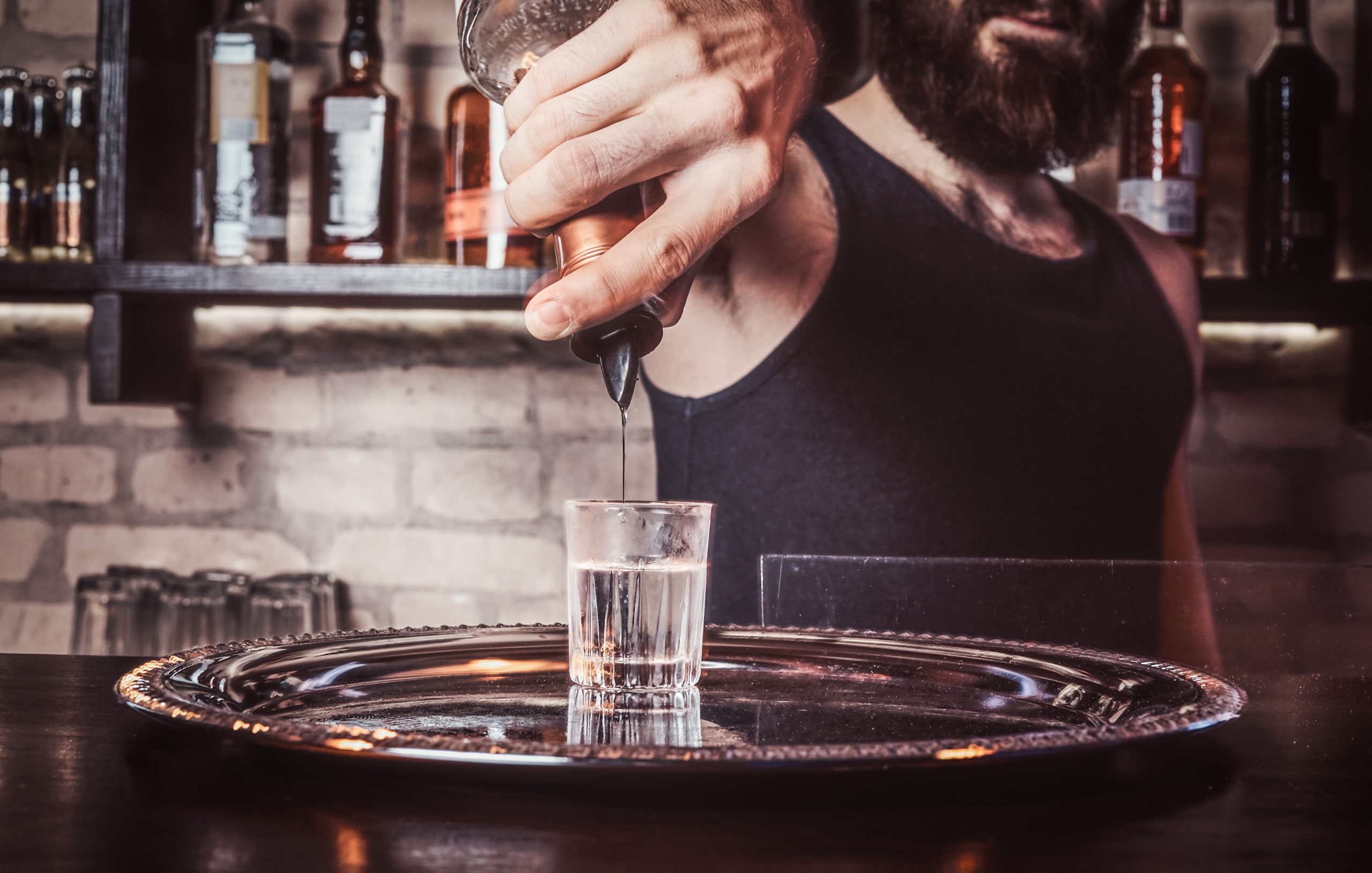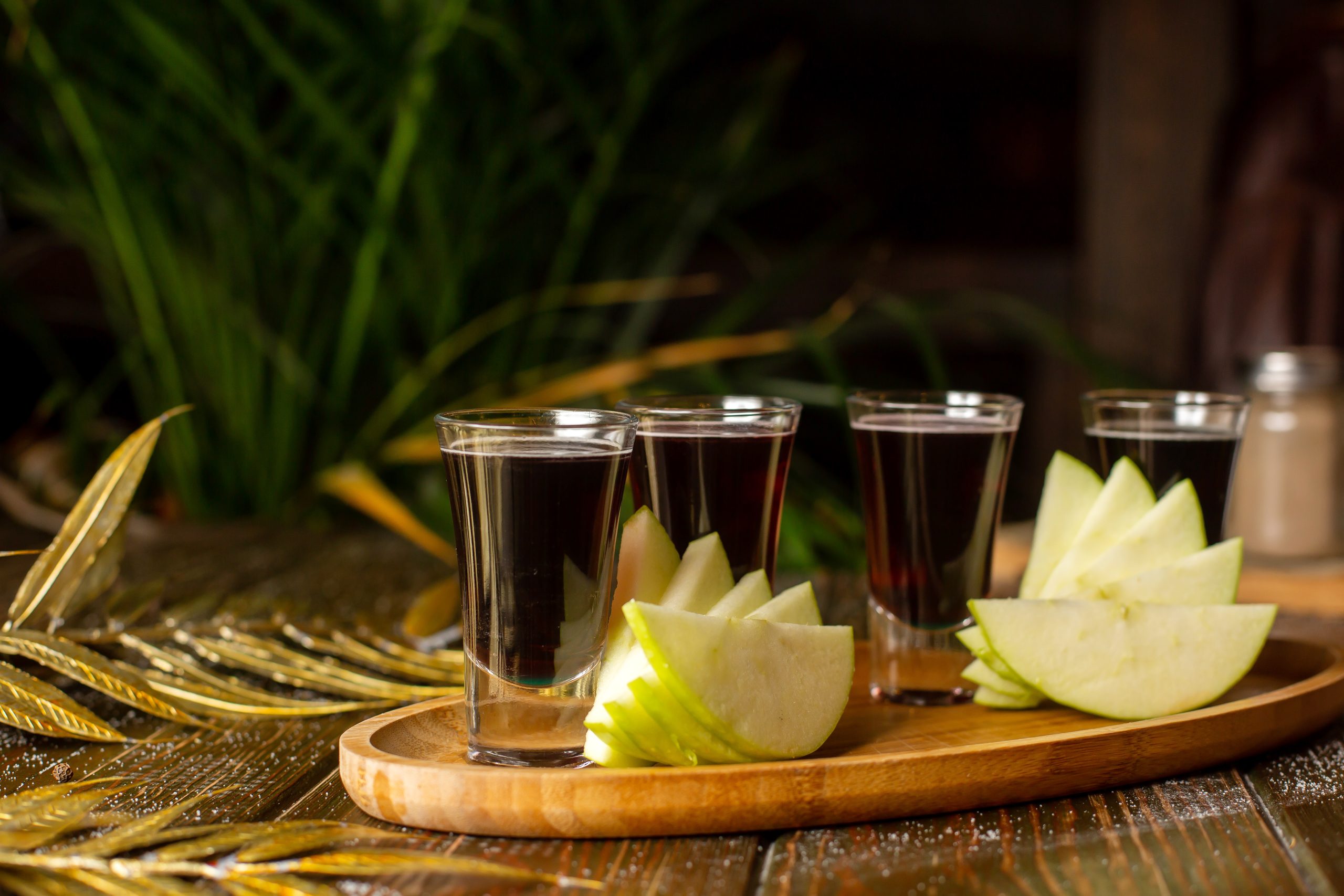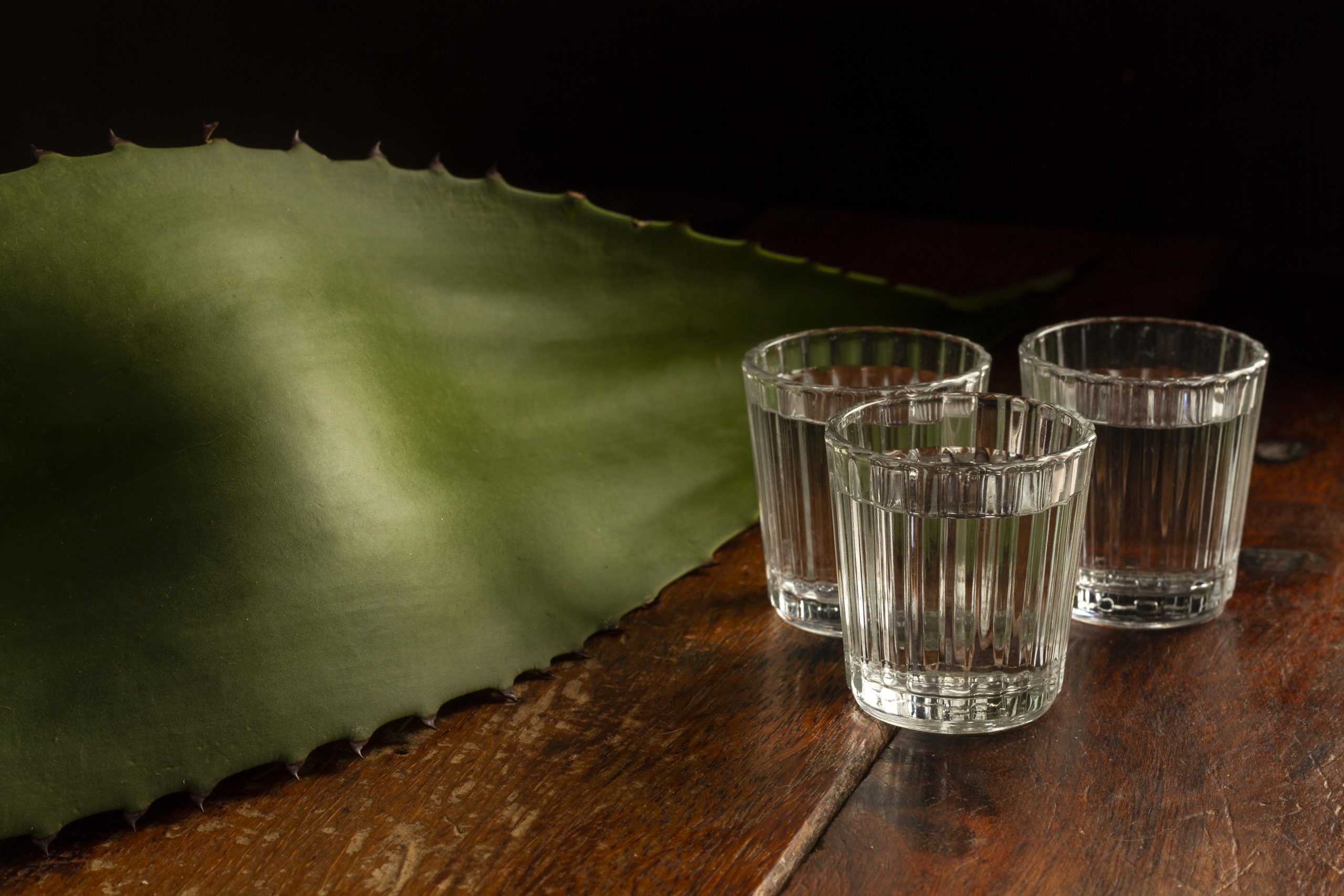Sambuca is a sweet, anise-flavored liqueur that originated in Italy. It is typically clear and transparent, but there are also variations with a deep blue color. The drink gets its distinctive taste from the essential oils of star anise, which gives it a licorice-like flavor.

Sambuca is often enjoyed as an after-dinner digestif and is commonly served neat or on the rocks. It can also be used as an ingredient in cocktails or as a flavoring agent in desserts and coffee. The high sugar content of Sambuca contributes to its sweetness, and it has an alcohol content ranging from 38% to 42% ABV (alcohol by volume).
What is Sambuca?
Sambuca has gained popularity worldwide and is enjoyed by many as a flavorful and aromatic liqueur. However, it’s important to consume alcoholic beverages responsibly and in moderation.
Traditionally, Sambuca is consumed by igniting it and drinking it while still aflame, although this is less common nowadays due to safety concerns.
The flaming effect is achieved by heating the liquid and releasing the alcohol vapors, which can then be ignited. This ritual is often accompanied by three coffee beans added to the glass, symbolizing health, wealth, and happiness.
What Does Sambuca Taste Like?
Sambuca has a distinct taste characterized by its strong anise or licorice flavor. It is sweet with a pronounced herbal and slightly spicy undertone. The primary flavor comes from the essential oils of star anise, which gives it a licorice-like taste. Some variations of Sambuca may also include other botanicals or spices, such as fennel, elderflower, or coriander, which can contribute to its overall flavor profile.
The sweetness of Sambuca comes from its high sugar content, which balances the intense anise flavor. The combination of sweetness and anise creates a unique and aromatic taste. The texture is typically smooth and velvety, making it enjoyable to sip neat or over ice.
When consumed, Sambuca leaves a warming sensation in the mouth due to its moderate to high alcohol content. The aftertaste can be lingering and slightly bitter, reminiscent of licorice candy.
The taste of Sambuca is an acquired preference, and people’s opinions on its flavor can vary. Some individuals enjoy the distinctive anise flavor, while others may find it too overpowering. If you appreciate the taste of licorice or anise, you are more likely to enjoy the flavor of Sambuca.
How to Consume Sambuca?
Sambuca can be enjoyed in various ways depending on personal preference. Here are some common ways to consume Sambuca:
- Neat: Sambuca can be served neat, which means pouring it into a glass and enjoying it as is, without any additional mixers or ice. This allows you to savor the full flavor of the liqueur.
- On the rocks: Sambuca can also be enjoyed over ice. Simply pour a serving of Sambuca into a glass with ice cubes, which can slightly dilute the liqueur and provide a refreshing chill.
- With water: Some people prefer to add a small amount of water to their Sambuca. This can help to open up the flavors and aromas of the liqueur. Add a few drops or a splash of water to your glass of Sambuca and stir gently before sipping.
- Flaming Sambuca: Although less common these days due to safety concerns, some people enjoy the traditional method of consuming Sambuca by igniting it. This involves heating the Sambuca, typically in a snifter glass, and then carefully lighting it on fire. Once the flame is extinguished, you can drink the Sambuca. Remember to exercise caution and follow safety guidelines if attempting this method.
- Cocktails: Sambuca can be used as an ingredient in various cocktails. It pairs well with other spirits like vodka or rum, and its sweet and anise flavors can add depth to mixed drinks. Popular Sambuca cocktails include the Sambuca Sour, Sambuca Martini, or the Sambuca Espresso Martini.
- Culinary uses: Sambuca can also be used in cooking and baking. It can be added to desserts, such as cakes or cookies, to infuse them with its distinct flavor. Sambuca can also be incorporated into sauces or glazes for savory dishes.
Is Sambuca Good for Health?
Sambuca, like other alcoholic beverages, should be consumed in moderation. While it is not typically considered a health drink, there are a few potential health benefits associated with certain ingredients found in Sambuca. However, it’s important to note that any potential benefits should be weighed against the potential risks and negative effects of alcohol consumption.
- Anise: Sambuca derives its distinct flavor from anise, which is a plant known for its medicinal properties. Anise has been traditionally used to aid digestion, alleviate bloating, and relieve respiratory issues. However, the amount of anise present in a serving of Sambuca may not provide significant therapeutic benefits.
- Moderate alcohol consumption: Moderate alcohol intake has been associated with certain health benefits, such as a reduced risk of cardiovascular disease. The key is moderation, which means consuming Sambuca or any alcoholic beverage in reasonable amounts. Excessive alcohol consumption can have detrimental effects on health, including liver damage, addiction, increased risk of accidents, and other health issues.
Can Pregnant Women Consume Sambuca?
No, pregnant women should avoid consuming Sambuca or any other alcoholic beverages. Alcohol consumption during pregnancy can have serious negative effects on the developing fetus. When a pregnant woman drinks alcohol, it passes through the placenta and can potentially harm the baby’s growth and development.
Exposure to alcohol during pregnancy can lead to a condition known as fetal alcohol spectrum disorders (FASDs), which can cause physical, behavioral, and cognitive impairments in the child. These effects can be permanent and lifelong. There is no known safe level of alcohol consumption during pregnancy, so it’s best to abstain from alcohol entirely to protect the health of the unborn baby.
If you are pregnant or planning to become pregnant, it is strongly recommended to consult with your healthcare provider for guidance on a healthy lifestyle during pregnancy, including avoiding alcohol consumption.
How to Store Sambuca?
To maintain the quality and flavor of Sambuca over time, it is important to store it properly. Here are some guidelines for storing Sambuca:
- Store in a cool, dark place: Sambuca should be stored away from direct sunlight, as exposure to light can cause the liqueur to deteriorate and lose its flavor. Choose a cool and dark location, such as a pantry or liquor cabinet, to store the bottle.
- Seal the bottle tightly: Ensure that the bottle is tightly sealed to prevent air from entering and affecting the quality of the Sambuca. The cap or cork should be securely fastened to maintain the freshness of the liqueur.
- Avoid extreme temperatures: Sambuca is best stored at a consistent temperature, preferably between 10°C to 20°C (50°F to 68°F). Fluctuations in temperature, especially extreme heat or cold, can impact the taste and quality of the liqueur. Avoid storing it near heat sources or in areas prone to temperature variations, such as near ovens or windows.
- Keep it upright: It is generally recommended to store Sambuca in an upright position. This helps prevent any potential leakage or deterioration of the cork or cap. However, if the bottle has a screw cap or a tight seal, storing it on its side should not cause any issues.
- Check for expiration dates: Sambuca, like other alcoholic beverages, may have an expiration date or a “best before” date. It’s a good practice to check the label for any specific storage recommendations or expiration information. While Sambuca doesn’t spoil like perishable foods, its quality may degrade over time.
Are There Any Side Effects of Sambuca?
Consuming Sambuca or any alcoholic beverage can have various side effects, especially if consumed in excessive amounts. Here are some potential side effects and considerations related to Sambuca:
- Alcohol-related effects: Sambuca contains alcohol, and excessive consumption can lead to the typical side effects associated with alcohol. These may include impaired judgment, decreased coordination, dizziness, nausea, vomiting, and hangover symptoms like headache and dehydration.
- Addiction and dependence: Regular and excessive consumption of Sambuca or any alcoholic beverage can lead to alcohol addiction or dependence. Alcohol addiction is a serious health condition that may require professional intervention to overcome.
- Interactions with medication: Alcohol, including Sambuca, can interact negatively with certain medications. It can increase the sedative effects of medications, affect their absorption or metabolism, and potentially lead to adverse reactions or reduced effectiveness. It is essential to consult with a healthcare professional or pharmacist to understand any potential interactions between Sambuca and your medications.
- Pregnancy-related risks: As mentioned earlier, consuming Sambuca or any alcoholic beverage during pregnancy can lead to fetal alcohol spectrum disorders (FASDs) and harm the developing fetus. It is strongly advised for pregnant women to abstain from alcohol completely.
- Impaired driving and accidents: Alcohol affects coordination, reaction time, and judgment, which can increase the risk of accidents or impaired driving if Sambuca is consumed before operating a vehicle or engaging in activities that require alertness and concentration.
- Increased calorie intake: Sambuca, like other liqueurs, contains calories from alcohol and sugar. Regular consumption can contribute to increased calorie intake, which may lead to weight gain or other related health concerns if not managed properly.
Conclusion
In conclusion, Sambuca is a sweet, anise-flavored liqueur that originated in Italy. It has a distinctive taste characterized by a strong licorice-like flavor. Sambuca can be enjoyed in various ways, such as neat, on the rocks, or in cocktails. However, it is important to consume Sambuca responsibly and in moderation, considering the potential side effects of alcohol and the associated risks.
Proper storage of Sambuca involves keeping it in a cool, dark place with a tight seal, away from direct sunlight and extreme temperatures. It’s also important to be aware of potential interactions with medications and the risks of alcohol-related effects, addiction, impaired driving, and increased calorie intake.

